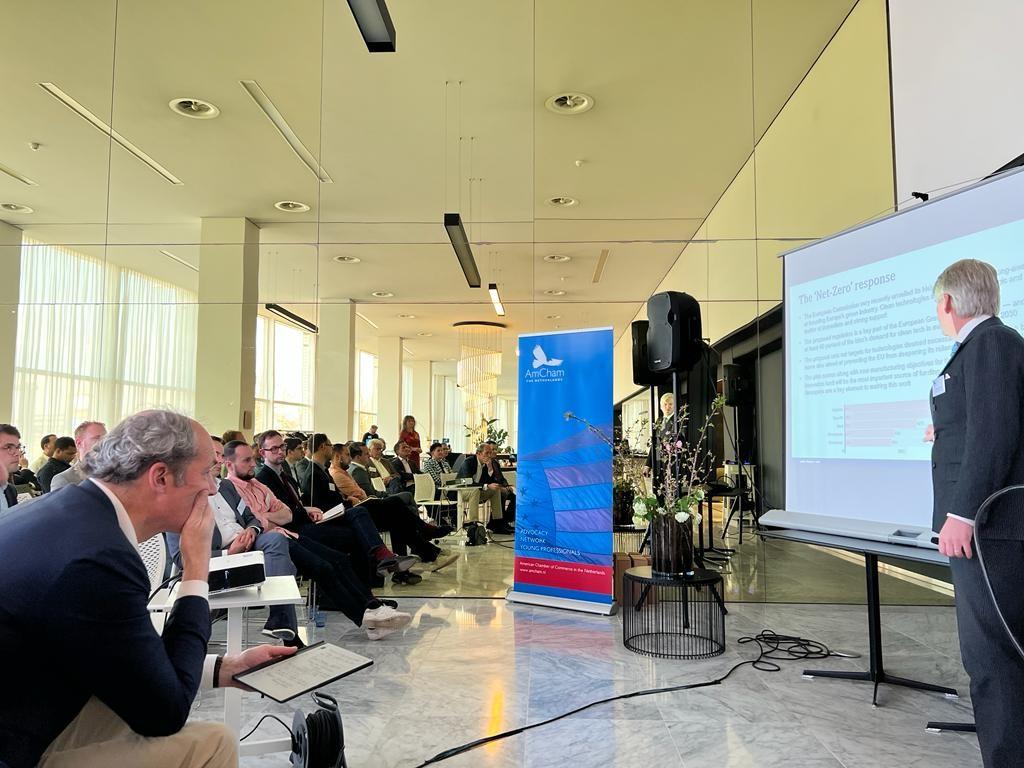On April 4, AmCham and its Rotterdam Chapter hosted an event on the Inflation Reduction Act (IRA) and the EU Response to the IRA at the offices of Maersk in Rotterdam. The IRA truly is a landmark U.S. federal law – aiming to curb inflation by reducing the deficit, lowering prescription drug prices, and investing into domestic energy production while promoting clean energy – and is much debated between Brussels and Washington DC as well.
Scott Pozil, Regional Senior Commercial Officer at the U.S. Department of Commerce, gave an overview of the IRA and its different components. The IRA directs nearly $400 billion in federal funding to clean energy, with the goal of substantially lowering the nation’s carbon emissions by the end of this decade. The funds will be delivered through a mix of tax incentives, grants, and loan guarantees. A comprehensive guidebook on the IRA is available on the website of the White House.
Richard Sterneberg, Partner and Head of Global Government Relations at DLA Piper provided insight in the EU’s response to the IRA. The European Commission very recently unveiled its Net-Zero Industry Act, a long-awaited proposal aiming at boosting Europe’s green industry. Clean technologies are regarded as strategic and therefore as a matter of immediate and strong support. The proposed regulation is a key part of the European Green Deal industry plan — and aims to ensure that at least 40 percent of the bloc’s demand for clean tech is made domestically by 2030. The proposal sets out targets for technologies deemed necessary to decarbonize the bloc’s economy, a move also aimed at preventing the EU from deepening its reliance on third countries like China. The plan comes along with new manufacturing objectives for these key technologies by 2030. The EU ETS innovation fund will be the most important source of funding. Reduced permitting procedures and timespans are a key element to making this work. China’s genuine dominance of clean tech supply chains spurred U.S. administration into action to ensure the U.S. does not cede the new global energy market to its greatest competitor. In turn, the EU has been forced to respond in order to keep its place at the top table of global manufacturing as solar panels, electric cars and wind turbines replace the heavy, polluting industries of the past. In essence climate change - for so long sidelined by policymakers in all three big powers - has become the great driving force of geopolitical and economic competition.
Dr. Julian Emami Namini, Lecturer at the Erasmus School of Economics, then explored the hidden economic effects of the IRA. Will the IRA reduce inflation as its name seems to promise? Dr. Emami Namini argued that rather than an inflation reduction program, IRA should be considered a public spending program to support U.S. industries and gain global market power. He zoomed in on the diversion of trade and investment flows and whether the U.S. now has or has not a comparative advantage in producing batteries and provided more food for thought around the sustainability of the focus on current “green” technologies, which is above all a political decision.
The event closed with a panel discussion where guests had the opportunity to ask questions.
AmCham cordially thanks Scott Pozil, Richard Sterneberg and Dr. Julian Emami Namini for their contributions, as well as Wouter den Heijer, Head of Ocean Fulfilment for Africa and Middle East Trades at Maersk, for the generous hospitality.
